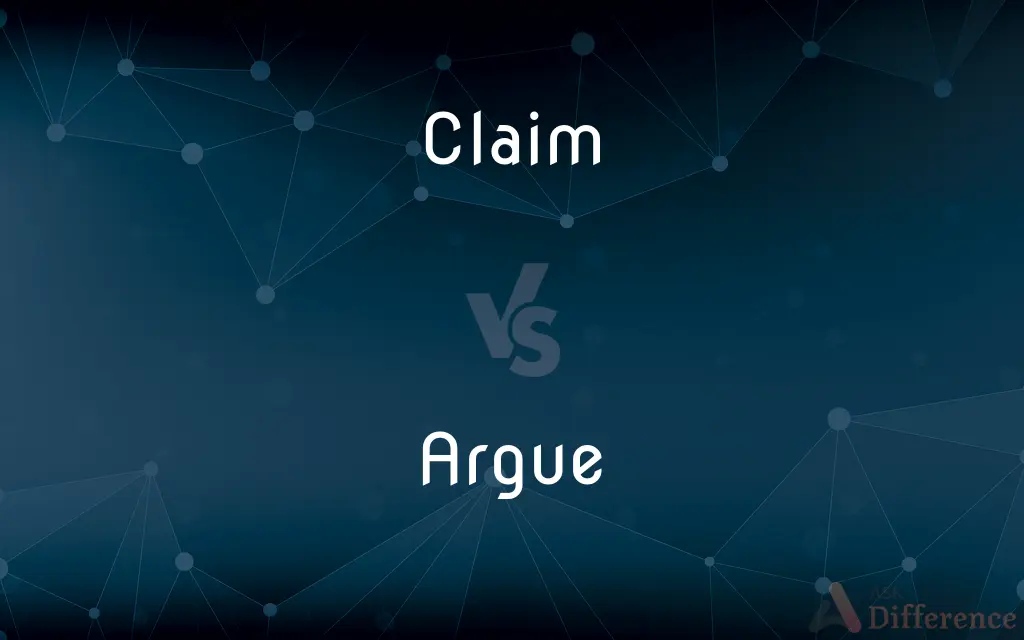Claim vs. Argue — What's the Difference?
Edited by Tayyaba Rehman — By Fiza Rafique — Updated on September 27, 2023
"Claim" means to state or assert something as a fact, while "argue" involves presenting reasons or evidence to support or oppose a particular point of view.

Difference Between Claim and Argue
Table of Contents
ADVERTISEMENT
Key Differences
"Claim" typically represents a declaration or assertion without necessarily providing immediate evidence or reasoning. On the contrary, "argue" implies a discourse or debate, where reasons are given in support or opposition of a particular statement or idea.
When someone makes a "claim," they are essentially putting forth a statement they believe to be true. In contrast, to "argue" means to delve deeper into that statement by providing rationale, contesting it, or discussing its implications.
It's possible for a person to "claim" something without needing to "argue" for it. However, in many contexts, especially in discussions or debates, a "claim" is often followed by an "argument" to substantiate it.
In some contexts, a "claim" can be a right to something, like claiming ownership. "Argue," on the other hand, doesn’t convey ownership but rather a process of reasoning or a disagreement.
In essence, "claim" is more about stating or asserting, while "argue" is more about justifying, discussing, or contesting.
ADVERTISEMENT
Comparison Chart
Nature
Statement or assertion.
Process of reasoning or debate.
Requirement of Evidence
Can exist without immediate evidence.
Often requires evidence or rationale.
Context
Can be a right or entitlement.
Typically involves a difference in opinion.
Involvement in Discourse
Can be a singular assertion.
Usually involves interaction or discussion.
Emotional Connotation
Neutral; simply a declaration.
Can imply disagreement or debate.
Compare with Definitions
Claim
To state something as a fact.
He claims that he saw the incident.
Argue
To engage in a disagreement or debate.
I'd argue that the evidence supports my view.
Claim
To assert ownership.
She claims this land as her own.
Argue
To indicate or suggest evidence.
The data argues for a new approach.
Claim
To demand or ask for something due.
He filed a claim for his insurance money.
Argue
To discuss the pros and cons of an issue.
Let's argue the merits of the plan.
Claim
To require or deserve.
The task claims all my attention.
Argue
To present reasons for or against something.
They argue about everything.
Claim
State or assert that something is the case, typically without providing evidence or proof
‘I'm entitled to be conceited,’ he claimed
Not every employee is eligible to claim unfair dismissal
The Prime Minister claimed that he was concerned about Third World debt
Argue
To persuade or convince.
He argued me into seeing his perspective.
Claim
Formally request or demand; say that one owns or has earned (something)
If no one claims the items, they will become Crown property
Argue
To put forth reasons for or against; debate
"It is time to stop arguing tax-rate reductions and to enact them" (Paul Craig Roberts).
Claim
Cause the loss of (someone's life)
The attacks claimed the lives of five people
Argue
To attempt to prove by reasoning; maintain or contend
The speaker argued that more immigrants should be admitted to the country.
Claim
An assertion that something is true
He was dogged by the claim that he had CIA links
Argue
To give evidence of; indicate
"Similarities cannot always be used to argue descent" (Isaac Asimov).
Claim
A demand or request for something considered one's due
The court had denied their claims to asylum
Argue
To persuade or influence (another), as by presenting reasons
Argued the clerk into lowering the price.
Claim
To demand, ask for, or take as one's own or one's due
Claim a reward.
Claim one's luggage at the airport carousel.
Argue
To put forth reasons for or against something
Argued for dismissal of the case.
Argued against an immediate counterattack.
Claim
To take in a violent manner as if by right
A hurricane that claimed two lives.
Argue
To engage in a quarrel; dispute
We need to stop arguing and engage in constructive dialogue.
Claim
To state to be true, especially when open to question; assert or maintain
Claimed he had won the race.
A candidate claiming many supporters.
Argue
To show grounds for concluding (that); to indicate, imply.
Claim
To deserve or call for; require
Problems that claim her attention.
Argue
(intransitive) To debate, disagree, or discuss opposing or differing viewpoints.
He also argued for stronger methods to be used against China.
He argued as follows: America should stop Lend-Lease convoying, because it needs to fortify its own Army with the supplies.
The two boys argued over a disagreement about the science project.
Claim
A demand for something as rightful or due.
Argue
(intransitive) To have an argument, a quarrel.
Claim
A basis for demanding something; a title or right.
Argue
(transitive) To present (a viewpoint or an argument therefor).
He argued his point.
He argued that America should stop Lend-Lease convoying because it needed to fortify its own Army with the supplies.
Claim
Something claimed in a formal or legal manner, especially a tract of public land staked out by a miner or homesteader.
Argue
To prove.
Claim
A demand for payment in accordance with an insurance policy or other formal arrangement.
Argue
To accuse.
Claim
The sum of money demanded.
Argue
To invent and offer reasons to support or overthrow a proposition, opinion, or measure; to use arguments; to reason.
I argue notAgainst Heaven's hand or will.
Claim
A statement of something as a fact; an assertion of truth
Makes no claim to be a cure.
Argue
To contend in argument; to dispute; to reason; - followed by with; as, you may argue with your friend without convincing him.
Claim
A demand of ownership made for something.
A claim of ownership
A claim of victory
Argue
To debate or discuss; to treat by reasoning; as, the counsel argued the cause before a full court; the cause was well argued.
Claim
The thing claimed.
Argue
To prove or evince; too manifest or exhibit by inference, deduction, or reasoning.
So many laws argue so many sins.
Claim
The right or ground of demanding.
You don't have any claim on my time, since I'm no longer your employee.
Argue
To persuade by reasons; as, to argue a man into a different opinion.
Claim
A new statement of something one believes to be the truth, usually when the statement has yet to be verified or without valid evidence provided.
The company's share price dropped amid claims of accounting fraud.
Argue
To blame; to accuse; to charge with.
Thoughts and expressions . . . which can be truly argued of obscenity, profaneness, or immorality.
Men of many words sometimes argue for the sake of talking; men of ready tongues frequently dispute for the sake of victory; men in public life often debate for the sake of opposing the ruling party, or from any other motive than the love of truth.
Unskilled to argue, in dispute yet loud,Bold without caution, without honors proud.
Betwixt the dearest friends to raise debate.
Claim
A demand of ownership for previously unowned land.
Miners had to stake their claims during the gold rush.
Argue
Present reasons and arguments
Claim
(legal) A legal demand for compensation or damages.
Argue
Have an argument about something
Claim
To demand ownership of.
Argue
Give evidence of;
The evidence argues for your claim
The results indicate the need for more work
Claim
To state a new fact, typically without providing evidence to prove it is true.
Claim
To demand ownership or right to use for land.
Claim
(legal) To demand compensation or damages through the courts.
Claim
(intransitive) To be entitled to anything; to deduce a right or title; to have a claim.
Claim
To cause the loss of, usually by violent means.
The attacks claimed the lives of five people.
A fire claimed two homes.
Claim
(obsolete) To proclaim.
Claim
(archaic) To call or name.
Claim
To ask for, or seek to obtain, by virtue of authority, right, or supposed right; to challenge as a right; to demand as due.
Claim
To proclaim.
Claim
To call or name.
Claim
To assert; to maintain.
Claim
To be entitled to anything; to deduce a right or title; to have a claim.
We must know how the first ruler, from whom any one claims, came by his authority.
Claim
A demand of a right or supposed right; a calling on another for something due or supposed to be due; an assertion of a right or fact.
Claim
A right to claim or demand something; a title to any debt, privilege, or other thing in possession of another; also, a title to anything which another should give or concede to, or confer on, the claimant.
Claim
The thing claimed or demanded; that (as land) to which any one intends to establish a right; ; as, a settler's claim; a miner's claim.
Claim
A loud call.
Claim
An assertion of a right (as to money or property);
His claim asked for damages
Claim
An assertion that something is true or factual;
His claim that he was innocent
Evidence contradicted the government's claims
Claim
Demand for something as rightful or due;
They struck in support of their claim for a shorter work day
Claim
An informal right to something;
His claim on her attentions
His title to fame
Claim
An established or recognized right;
A strong legal claim to the property
He had no documents confirming his title to his father's estate
He staked his claim
Claim
A demand especially in the phrase
The call of duty
Claim
Assert or affirm strongly; state to be true or existing;
He claimed that he killed the burglar
Claim
Demand as being one's due or property; assert one's right or title to;
He claimed his suitcases at the airline counter
Mr. Smith claims special tax exemptions because he is a foreign resident
Claim
Ask for legally or make a legal claim to, as of debts, for example;
They claimed on the maximum allowable amount
Claim
Lay claim to; as of an idea;
She took credit for the whole idea
Claim
Take as an undesirable consequence of some event or state of affairs;
The accident claimed three lives
The hard work took its toll on her
Claim
A declaration made about something.
Her claim was that the story was untrue.
Common Curiosities
Can a claim be made without evidence?
Yes, a claim can be made without immediate evidence, but evidence might be necessary for it to be accepted.
Can you argue in favor of a claim?
Yes, when you argue in favor of a claim, you provide reasons or evidence supporting it.
Is arguing always about disagreement?
No, argue can also mean presenting reasons for or against something, not just disagreement.
If someone states a fact, is that a claim?
Yes, stating something as a fact is making a claim.
Can you argue with facts?
Yes, facts can be presented as part of an argument to support a claim.
Can a single statement be both a claim and an argument?
Typically, a claim is what you're asserting, while the argument supports the claim. They can be part of the same statement, but they serve different roles.
Is an insurance request a type of claim?
Yes, in that context, a claim refers to a formal request for payment.
Do all arguments involve two opposing sides?
Not necessarily. An argument can just be a presentation of reasons for a single point of view.
Does arguing imply a heated exchange?
Not always. While arguing can involve disagreement, it can also be a calm, reasoned exchange of views.
Is every claim followed by an argument?
No, but in debates or discussions, claims are often substantiated with arguments.
Is a claim always verbal?
No, claims can be written, verbal, or even implied in some contexts.
Can claims be subjective?
Yes, claims can be both subjective opinions or objective facts.
Can claims be visual?
While claims are typically verbal or written, visual representations can imply or suggest claims.
What's the primary purpose of arguing?
To present reasons or evidence to support or oppose a viewpoint.
Can a claim be retracted?
Yes, a person can retract or withdraw a claim they've made.
Share Your Discovery

Previous Comparison
Stump vs. Log
Next Comparison
Transpiration vs. SweatingAuthor Spotlight
Written by
Fiza RafiqueFiza Rafique is a skilled content writer at AskDifference.com, where she meticulously refines and enhances written pieces. Drawing from her vast editorial expertise, Fiza ensures clarity, accuracy, and precision in every article. Passionate about language, she continually seeks to elevate the quality of content for readers worldwide.
Edited by
Tayyaba RehmanTayyaba Rehman is a distinguished writer, currently serving as a primary contributor to askdifference.com. As a researcher in semantics and etymology, Tayyaba's passion for the complexity of languages and their distinctions has found a perfect home on the platform. Tayyaba delves into the intricacies of language, distinguishing between commonly confused words and phrases, thereby providing clarity for readers worldwide.
















































